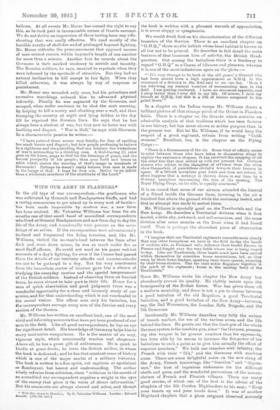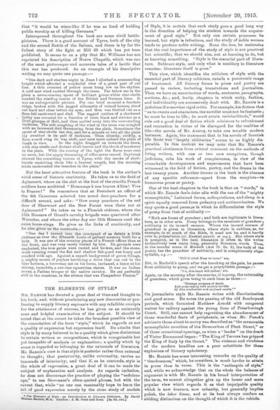WITH OUR ARMY IN FLANDERS.* IF the old type of
war correspondent—the gentleman who was cultivated by Generals and Headquarters Staffs, and had a roving commission to get mixed up in every sort of battle— has been made impossible by modern war, a new form has been evolved. Mr. Valentine Williams has been for six months one of that small hand of accredited correspondents who lived at General Headquarters and saw from day to day the life of the Army, and occasionally were present on the outer fringe of an action. If the correspondent were adventurously inclined and frequented the firing trenches, and, like Mr. 'Williams, visited the no-man's-land between the lines after dark and went down mines, he was as much under fire us most Staff officers. He could not send .to his paper red-hot Recounts of a day's fighting, for even if the Censor had passed them the details of our intricate attacks and counter-attacks are not to be gathered in a day. But his very remoteness from the immedinte centre of interest gave him a chance of studying the everyday routine and the special temperameut of the British soldiers. Instead of observing them on hurried tours, he came almost to take part in their life. Hence for a man of quick observation and good judgment there was a wonderful opportunity for a close and leisurely study of our armies, and for that understanding which is not vouchsafed to the casual visitor. The officer sees only his battalion, but the correspondent surveys every arm of the Service and every section of the theatre.
Mr. Williams has written an excellent book, one of the most vivid and informing accounts that have yet been produced of our men in the field. Like all good correspondents, he has an eye for significant detail. His knowledge of Germany helps him to many instructive comparisons. He is the master of an easy, vigorous style, which occasionally reaches real eloquence. Above all, he has a great gift of enthusiasm. He is quick to kindle at great deeds ; he loves the British soldier, to whom the book is dedicated; and he has that constant sense of history which is one of the major merits of a military bistorian. The book is written in a flue spirit, not captious or egotistical or flamboyant, but honest and understanding. The author wisely refrains from criticism, since " criticism in the mouth of an accredited war correspondent acquires a weight in the eyes of the enemy that gives it the value of direct information." But his comments are always shrewd and sober, and though With Our Army is Piandere. Dy G. Valentino 'Williams. London : Edward Arnold. [12m, ed. not.] the book is written with a pleasant warmth of appreciation, it is never sloppy or sycophuntie.
We would dwell first on his characterization of the different branches of the Service. There is an excellent chapter on "G.H.Q.," those mystic initials whose local habitat is known to all but not to be printed. He describes in full detail the main features of that immense hive of activity, the British Head- quarters. Out among the battalions there is a tendency to regard "G.H.Q." as a Capua of idleness and pleasure, whereas it is one of the most industrious spots on the globe :- "' It's very strange to be back at the old game,' a General who had been moved from a high appointment at G.H.Q. to the command of a division in the field said to me one day. 'Here I am following my natural vocation of oennuanding men in the field. I am getting sunburnt. 1 have an enormous appetite, and I sleep better than I ever did in my life. Of course, I miss my friends at G.H.Q., but this is a life of leisure compared to the grind there.'" In a chapter on the Indian troops Mr. Williams draws a brilliant picture of that strange patch of the Orient in Flanders fields. There is a chapter on the Guards which contaius an admirable analysis of that tradition which has been famous in our history, but has never shown to nobler purpose than in the present war. But let Mr. Williams, if he would keep the respect of a great regiment, refrain from writing " Cold- streams." Excellent, too, is the chapter on the Flying Corps :- " There is a freemasonry of the air. Some kind of affinity seems to exist between those who have taken to themselves wings to explore the vaetnessee of space. It lava survived the snapping of all the other ties that once united us with our present foe. German airmen who rejoice in the slaughter of civilians from the skies show themselves of punctilious chivalry towards their foemen in space. If a British aeroplane goes forth and does not return, it often happens that a message is thrown down in our lines by a German aeroplane announcing the fate of the missing. The Royal Flying Corps, on its side, is equally courteous."
It is on record that some of our airmen attended the funeral of a friend inside the German lines, hovering iu the air a hundred feet above the ground while the ceremony lasted, and that no attempt was made to molest theta.
Mr. Williams is specially good on the Territorials and the New Army. He describes a Territorial division when it first landed, a little shy, awkward, and self-conscious, and the saute division after sonic months at the front when it had found itself. That is perhaps the shrewdest piece of observation in the book.
"I imagine that our Territorial regiments resemble more closely than any other formations we have in the field to-day the bands of archers who, as Froissart tells, followed their feudal Barons to Franco and fought over the very fields where war is being waged to-day. Like our Territorials, these bands must have been united within themselves by countless home associations, led, as they were, by their home leaders, speaking their home speech, swearing by their home shrines. The tie that welds Regnlars together is the spirit of the regiment; home is the uniting bond of the Territorials."
Since Mr. Williams wrote his chapter the New Army has abundantly proved its quality. He rightly insists upon the homogeneity of the British forces. War has given them all a uniform mentality, and there is not a pin to choose between a good battalion of the old Regulars, a good Territorial battalion, and a good battalion of the New Army—between, say, the 2nd Worcesters, the London Rifle Brigade, and the 7th Camerons.
Incidentally Mr. Williams describes very fully the nature of trench warfare, the use of the various arms, and the life behind the lines. He points out that the linch-pin of the whole German system is the machine gun, since "the German, possess- ing this weapon in far greater numbers than his opponents, has been able by its means to increase the fire-power of his battalions to such a point as to give him actually the effect of superior numbers." We hold our trenches with infantry, the French with their 75's," and the Germans with machine guns. There are some delightful notes on the new slang of the Army, French borrowings like "function" and " clegom- mer," the host of ingenious nicknames for the different shells and guns, and the wonderful perversions of the nomen-
clature of French and Flemish villages. There are many good stories, of which one of the best is the advice of the chaplain of the 5th Gordon Highlanders to his men: "Keep your hearts up and your heads darn." It was of another Highland chaplain that a pious sergeant observed morosely
that "it would be wiser-like if he was as fond of holding
public worship as of killing Germans."
Interspersed throughout the book are some vivid battle- pictures. There is a good account of Ypres, both of the city and the second Battle of the Salient, and there is by far the fullest story of the fight at Hill 60 which has yet been published. It seems to us a pity that Mr. Williams has not reprinted his description of Neuve Chapelle, which was one of the most picturesque and accurate tales of a battle that this war has produced. As an example of his descriptive writing we may quote one passage :—
"One dark and starless night in June I climbed a commanding height which afforded a wonderful view of a great part of our lino. A thin crescent of yellow moon hung low on the skyline. A cold east wind rustled through the trees. Far below me in the plain a never-ceasing spout of brilliant green-white star-shells marked the winding course of the British and German lines. It was an unforgettable picture. For one brief moment a desolate ridge, broken with the jagged silhouette of ruined houses, stood out hard and clear before my eyes, and then was blotted out as a flare fell earthward and died. The ragged outline of a shattered belfry was revealed for a fraction of time, black and sinister as a Dore glimpse of Hell, and then melted away into the surrounding darkness. Tbe soft soughing of the wind in the trees was mingled with an incessant dull thrumming from the plain. Sometimes the spout of star-shells ran dry, and for a minute or two all the plain lay swathed in its pall of darkness. Then silently, swiftly, a flare would wing its way aloft, and once more unhare the plain of death to view. . . So the night dragged on towards the dawn, with star-shells and distant shell-bursts and the throb of musketry in the plain. With the coming of the light the flares were seen no more, but the angry drumming of rifles never ceased. Daybreak showed the crumbling towers of Ypres, with the smoke of shell- bursts encircling them like is funeral wreath, but the morning mists enshrouded the trenches in the plain."
Not the least attractive feature of the book is the author's vivid sense of historio continuity. He takes us to the field of Agincourt, where on the slab at the foot of the crucifix French soldiers have scribbled 4. Hommage h nos braves Allies I Vive la France!" He remembers that at Festubert an officer of the 4th Camerons selected two noted deer-poachers for a difficult errand, and mike: " How many poachers of the red deer of Sherwood and the New Forest were there not at Agincourt?" He takes us to a Flemish chateau, where the 15th Hussars of Grant's cavalry brigade were quartered after Waterloo, and where the other day our 15th Hussars used the same horse-rings. He gives us the links of continuity, and he also gives us the contrasts :— " One day I turned into the courtyard of as dainty a little chlteau as ever the fifteenth Louis of gallant memory built for a lady. It was ens of the country places of a French officer then at the front, and was vary rarely visited by him. Its grounds were neglected, the iron gates were rusted and broken, and the stone- work running round the fiat and shallow fish-pond was hoary and cracked with age. Against a superb background of green foliage, it mighty screen of poplars bordering a drive that ran out to the blue horizon, a horseman sat on his horse, turbaned, a lance at his stirrup, immobile, a suthime equestrian statue. It was an Indian sower, a Pathan trouper of the native cavalry. Be rat perfectly still in the sunshine, in the silence, that was Pompadour France."















































 Previous page
Previous page